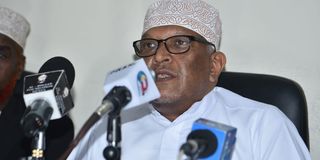Muslims urged to go for mediation in dispute resolution

Chief Kadhi Ahmed Mohdhar announcing that Idd Prayers to be conducted on Friday. He has called on Muslims to seek alternative dispute resolution avenues.
Muslims across the country have been urged to embrace mediation to settle disputes instead of wasting judicial time with trivial matters.
Chief Kadhi Sheikh Ahmed Muhdhar noted that most of the cases being filed before the Kadhi’s Court can be solved through mediation.
“People should first try mediation before rushing to court. Mediation saves time, resources and it is cheaper than the normal court process,” he said.
Speaking during a virtual session with Muslim clerics from the Coast region, Sheikh Muhdhar noted that small family differences should not end up in courts.
He cautioned that the court process was unfriendly and therefore the alternative dispute system should be given priority before any further step is taken.
“Once you file your case in court, it will take long before the decision is rendered. This is both time-consuming and very expensive,” he said.
“Some issues are better dealt with at the family level. Issues of divorce, inheritance and the marital problem should be solved by a mediator invited by the parties involved,” he added.
The session was also attended by Wakf Commission of Kenya Chief Officer Dr Ibrahim Bulushi and Human Rights Agenda (HURIA) executive director Yusuf Mwatsefu.
The virtual meeting brought together Muslim Judiciary stakeholders and the clerics.
They stressed the importance of mediation to help in reducing the number of disputes being filed at the various Kadhi’s courts in Kenya.
Sheikh Muhdhar noted that mediation resolutions were easier to be complied with because they are engineered by the parties in the dispute as compared to the court rulings that may be harsh and unsatisfactory to one or both parties.
He said that mediation in most cases ensure that the relationship among the people involved in a dispute is not broken because the entire process is harmonious and friendly.
“Courts should be the last port of call. Try mediation first then go to court if it fails,” he said.
Article 159(2) (c) of the Constitution recognises mediation and encourages it to be applied by courts as a form of dispute resolution.
The Judiciary implemented court-annexed mediation to help resolve cases that are not necessarily required to go through the normal court process.
Court annexed mediation is a mediation process conducted under the umbrella of the court.
Once a case is filed in court, the Mediation Deputy Registrar examines it to assess whether or not they are suitable for mediation.
The mediation process takes at least 60 days hence this ensures quick disposal of matters that would have taken years in the normal court hearing process.
Sheikh Muhdhar noted that the Muslim community should take advantage of this quick way of disposing of disputes as opposed to the normal court hearings.




